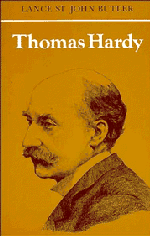Book contents
6 - Tess of the d'Urbervilles
Published online by Cambridge University Press: 03 May 2011
Summary
INTRODUCTORY
In Hardy's two last major novels, Tess of the d'Urbervilles and Jude the Obscure, his manner of integrating a love story into its natural environment is expanded to its widest dimensions. A third level, as it were, is added, and this is the symbolic, allegorical and cosmic element found in The Return of the Native and The Mayor of Casterbridge. A vivid general picture of man's relationship to the cosmos emerges in Tess and Jude, and the success of these novels depends on Hardy's ability to unify this general picture with his love story and its natural background. In Tess, particularly, this unification works almost perfectly. In this novel Hardy succeeds in integrating the personal emotions of an obscure girl with an intense study of nature and an overall view of the cosmos and the meaning of man's existence. All this is set within a realistic historical framework, so that while Tess is about love, nature and the cosmos, it is also, without any disruption of its unity, about nineteenth-century beliefs concerning religion and morality. It is the novel in which Hardy integrates all these elements most thoroughly; as a result it is not easy to separate the different strands of the novel's symbolism. However, it is possible to go some way towards this by telling the story of Tess from various points of view: it can be seen as a love story, a pastoral romance, an allegory of man's progress through the world, and a study of late-nineteenth-century agnosticism in its impact on a Christian or supposedly Christian society.
- Type
- Chapter
- Information
- Thomas Hardy , pp. 96 - 119Publisher: Cambridge University PressPrint publication year: 1978



